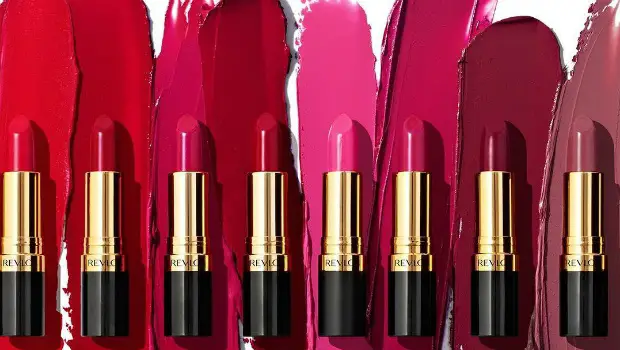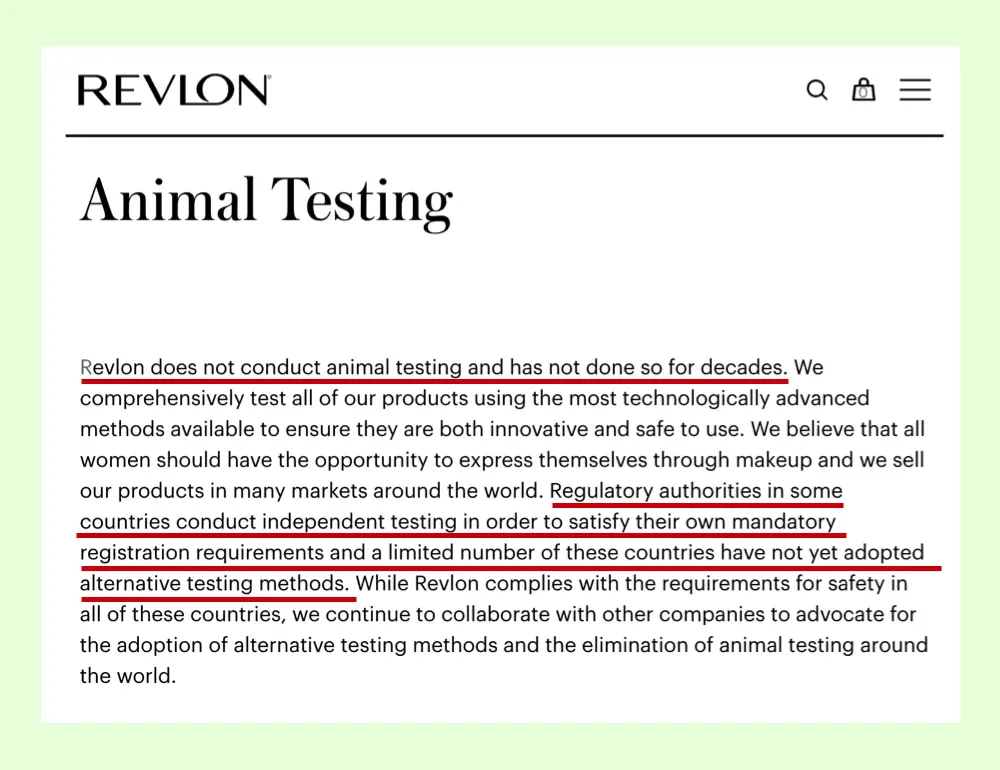Many people, including your grandmother, have used and loved Revlon. However, as a modern consumer, you may wonder if Revlon has maintained ethical practices throughout its history and if it is cruelty-free and vegan.
Revlon is not 100% cruelty-free or vegan, as its products are sold where animal testing is required by law. It also cannot be considered vegan as it is not cruelty-free.
For much of the 20th century, Revlon was the second-largest cosmetics company in terms of sales in the United States. However, the brand has also faced controversy over its animal testing practices.
In this article, we will examine Revlon's current policies on animal testing and whether you should support this brand.
Revlon's Ethical Overview
Revlon is Not Cruelty-Free
Test any of its products or ingredients on animals
NO
Purchase any ingredients tested on animals within its supply chain
No
Distribute its products to any countries that require animal testing by law.
YES
Revlon states that they do not conduct animal testing, but as you’ll find out, that doesn’t mean they are cruelty-free.
Revlon is owned by Revlon Inc, a beauty conglomerate that owns Elizabeth Arden, Almay, Juicy Couture, and CND, among others.
Does Revlon Test on Animals?
Revlon has been transparent that it conducts animal testing when required by law and does ship to countries like China. However, this is after some controversy.
And yes, they still have a stance on cruelty-free cosmetics.
What Is Revlon's Cruelty-Free Status in 2022?
Here is a screenshot of Revlon’s official statement regarding its cruelty-free policies and vegan products, taken from its website:
Revlon Has No Cruelty-Free Certification.
Revlon was on PETA’S Cruelty-Free list for two decades before it was discovered that Revlon was sold in China. PETA had not been informed of this decision, so with suspicious reports coming in, PETA bought enough stock in Revlon to become a stakeholder in 2012. This allowed them to gather the evidence they needed to confirm their fears about Revlon selling in China.
Their grand reveal came at an Annual Stakeholders Meeting when they shared their findings and formally stripped Revlon of their PETA certification in June 2013.
Ideally, all brands that consider themselves cruelty-free should be Leaping Bunny certified.
While you might know PETA very well – it surprisingly doesn't hold the strictest cruelty-free regulations. Leaping Bunny certification is the gold standard to live up to.
Is Revlon Sold Where Animal Testing is Required By Law?
Revlon does distribute its products to China, a country that requires animal testing on cosmetics by law.
China has a shocking track record. It is the country with the most animal testing globally, with over 20 million animals used per year.
However, if you live in China or are concerned about its cruel beauty policies, there are a couple of loopholes.
Here's how to find cruelty-free cosmetics in China: Are Cosmetics Made in China Cruelty-Free?
Revlon is Not Vegan
Although Revlon claims to have vegan products, it’s hard to consider any of its products free of animal-derived ingredients as “vegan” because it’s not 100% cruelty-free.
Does it have products that are free of animal-derived ingredients? Yes.
Are these products considered holistically vegan? Not in our opinion.
Revlon doesn’t share their ingredient lists online, so there’s no way of knowing which animal-derived ingredients they use.
Some of the most common ones used in the beauty industry are: honey, beeswax, lanolin, squalane, collagen and carmine.
If you're interested in finding vegan brand alternatives – keep reading or click on this link: Vegan brand alternatives to Revlon.
Vegan Alternatives to Revlon
Brand | price range | 100% vegan | Certification |
|---|---|---|---|
$15 - $34 | Yes | PETA | |
$20 - $50 | Yes | Leaping Bunny | |
$24 - $36 | Yes | PETA, Leaping Bunny | |
$6 - $170 | Yes | PETA | |
$15 - $30 | Yes | Leaping Bunny |
Revlon is Not Considered Natural, or Organic
However, it does claim to use safe, simple, and clean ingredients.
Its whole ethos is to make clean formulas and products that anyone can use.
Clean vs. Natural Ingredients
Revlon does claim to use safe, simple, and clean ingredients.
Its whole ethos is to make clean formulas and products that anyone can use.
All products use a certain amount of synthetic ingredients in their formulas. Revlon is no exception – but it does choose to use better or clean synthetics.
If a synthetic ingredient is "clean," it means it is safe and non-toxic for us. Its purpose is to preserve the stability of a beauty formulation.
Revlon Has a 73% - 91% Allergen-free Ranking
According to Skin Safe has an average 91% allergen-free ranking for each product, but some products dip as low as 73% while others are 100% safe.
Revlon does not use BHA, Cocamide DEA, formaldehyde, toluene, dibutyl phthalate, phthalates, or triclosan.
The EU/UK Have Stricter Ingredient Regulations
We don’t want to scare you, but you HAVE to read up on any product’s ingredient list before you make a purchase – especially if you live within the United States. The reason why will shock you.
The FDA has only banned or restricted 11 harmful chemicals from cosmetics within the country. Europe and the UK, on the other hand, have banned 1,328!
Revlon does not market itself as a clean beauty brand. Revlon did release an EWG (Environmental Working Group) approved product called PhotoReady Prime Plus Perfecting + Smoothing Primer in 2021, which is considered clean.
But it’s still worth knowing that with makeup, you want to avoid these ingredients:
Revlon Has Limited Sustainable and Ethical Causes
Some of the ethical causes Revlon supports are:
It's no secret that the world has a huge waste problem, and cosmetic brands only make it worse by using unsustainable packaging and harmful ingredients.
Revlon takes environmental accountability by:
Final Thoughts
Revlon is not cruelty-free and vegan, and until they decide to pull out of China, they won’t be.
While there is some ingredient sourcing transparency, the same can’t be said for their supply chain. They also don’t do much in the way of sustainability.
In fact, other drugstore brands and much smaller competitors are doing a lot more to reduce waste, create packaging with less impact, and use green energy.
Revlon’s product offering has moved with the times, but their perspective on what consumers what hasn’t. Unfortunately, we don’t see them changing their ethical stance soon.


